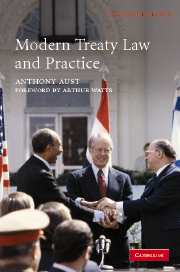Book contents
- Frontmatter
- Contents
- Foreword to the first edition by Sir Arthur Watts
- Preface to the second edition
- Articles of the Convention cited in the text
- Table of treaties
- Table of MOUs
- Table of cases
- Glossary of legal terms
- List of abbreviations
- Introduction
- 1 Vienna Convention on the Law of Treaties 1969
- 2 What is a treaty?
- 3 MOUs
- 4 Capacity to conclude treaties
- 5 Full powers
- 6 Adoption and authentication
- 7 Consent to be bound
- 8 Reservations
- 9 Entry into force
- 10 Treaties and domestic law
- 11 Territorial application
- 12 Successive treaties
- 13 Interpretation
- 14 Third states
- 15 Amendment
- 16 Duration and termination
- 17 Invalidity
- 18 The depositary
- 19 Registration and publication
- 20 Dispute settlement and remedies
- 21 Succession to treaties
- 22 International Organisations
- 23 Drafting and final clauses
- Appendices
- Index
Introduction
- Frontmatter
- Contents
- Foreword to the first edition by Sir Arthur Watts
- Preface to the second edition
- Articles of the Convention cited in the text
- Table of treaties
- Table of MOUs
- Table of cases
- Glossary of legal terms
- List of abbreviations
- Introduction
- 1 Vienna Convention on the Law of Treaties 1969
- 2 What is a treaty?
- 3 MOUs
- 4 Capacity to conclude treaties
- 5 Full powers
- 6 Adoption and authentication
- 7 Consent to be bound
- 8 Reservations
- 9 Entry into force
- 10 Treaties and domestic law
- 11 Territorial application
- 12 Successive treaties
- 13 Interpretation
- 14 Third states
- 15 Amendment
- 16 Duration and termination
- 17 Invalidity
- 18 The depositary
- 19 Registration and publication
- 20 Dispute settlement and remedies
- 21 Succession to treaties
- 22 International Organisations
- 23 Drafting and final clauses
- Appendices
- Index
Summary
Experience is the name everyone gives to their mistakes.
Like contracts in ordinary life, treaties have always been an indispensable tool of diplomacy. They date from even before the classical period of Greece, the Egyptian and Hittite Kings having concluded a treaty in 1272 BC. After 1815, so many treaties were adopted that Canutelike words of caution were voiced. By 1914, there were already perhaps over 8,000 treaties in force. With the establishment of the League of Nations, the rate of treaty making increased dramatically. Up to July 1944 the League registered 4,822 treaties, to which should be added ones concluded between non-members of the League. Since 1945, some 54,000 treaties have been registered with the United Nations, though this is perhaps only about 70 per cent of all treaties which have entered into force.
So, anyone whose work or interest involves international law needs to know about the law of treaties. In writing this book my purpose has been to meet a long-felt need for a work on the law of treaties which deals with the subject in a comprehensive, up-to-date and practical way. Unlike other aspects of international law, the making and operation of treaties happens every day, and so understanding treaty practice enhances knowledge of the law of treaties. With very few exceptions, international law cannot be practised full-time except in a foreign ministry or an international organisation.
- Type
- Chapter
- Information
- Modern Treaty Law and Practice , pp. 1 - 5Publisher: Cambridge University PressPrint publication year: 2007



